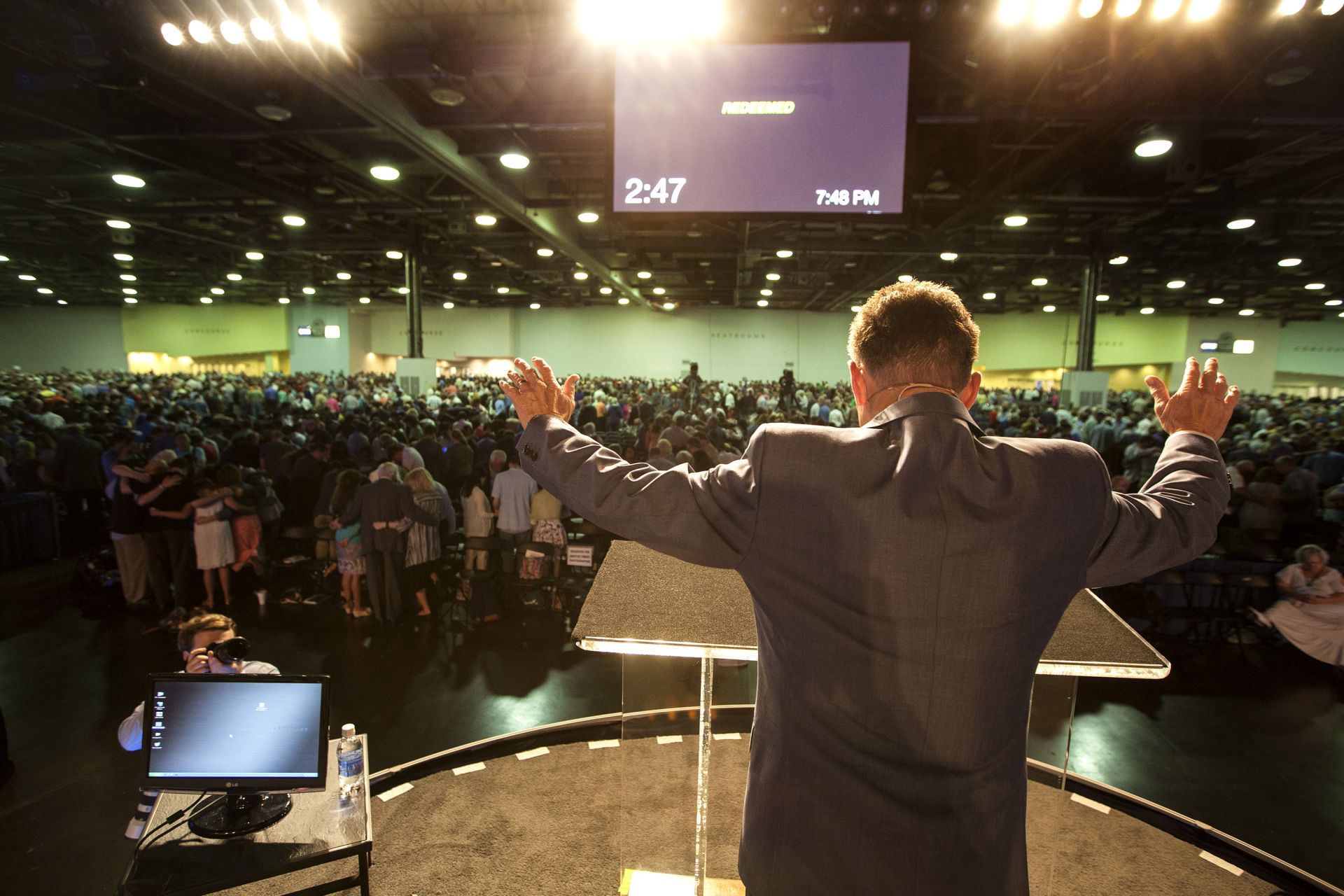
by Brian Hobbs | Jun 18, 2015
I have been attending the annual meeting of the Southern Baptist Convention, off and on (mostly on), since 2007, even before I was a State Convention staffer. I confess that I love these meetings, both seeing the people and hearing about the work God is doing around the world through the people called Southern Baptist.
The 2015 SBC meeting on June 16-17 in Columbus, Ohio, looked different from other years in various ways. I offer these three observations.
1. No time for ‘well-fed normalcy’
With shrinking membership rolls comes the prospect of a much smaller denomination in future years. Gone are the days of assuming Southern Baptists will be the first choice among people looking for a church. We clearly recognize that now is not the time to exude a “well-fed normalcy,” to borrow a World War II-era phrase. The 2015 SBC meeting is a reminder to stay committed to our shared mission and cooperation, and to promote the Gospel and each other, not tear down.
2. Well, this is different
I am not old enough to remember the SBC meetings of decades past. I sometimes wonder what it would be like to have been a Southern Baptist in the heyday of the 70s and 80s. What it would have been like to hear Dr. Adrian Rogers preach and the messengers sing old-fashioned hymns, while dressed in their Sunday best. To be sure, today’s meetings are more casual and don’t command the attendance numbers of yesteryear. Yet we can rejoice that the SBC looks much more diverse ethnically and geographically, and we have made technological advances too that show we are ready to meet people where they are at. I love, admire and revere our forefathers, and I would caution our Convention from ever taking a “Rehoboam” attitude, favoring to a fault the new ways. At the same time, we can embrace the fresh ideas and enthusiasm for sharing the Gospel that we heard about in Ohio.
3. Pray more, stand on the Word
From the Tuesday evening prayer to the themes on which the pastors preached, it was evident the SBC is not shrinking back in fear of a changing culture. It is evident we are committed to our biblical convictions, but we want to be more prayerfully dependent on God for the end result. Probably my favorite sermon from the Pastors Conference came from Ethics & Religious Liberty President Russell Moore. “There were days when we would gather for this meeting and the signs all up and down the city streets would say ‘Welcome Southern Baptists,’” said Moore. “Now in this city, the signs up and down the streets talk about the Stonewall Gay Pride Festival. The culture around us is changing. We are moving into a new time, and the temptation we are going to have is to move into that changing culture with a lack of confidence and a spirit of fear. But Jesus shows us the antidote to fear, and antidote to fear is the Gospel of the Kingdom of Jesus Christ.”
For full coverage from the SBC meeting, I recommend you check out www.baptistmessenger.com and www.baptistpress.com. And about next year’s SBC meeting in St. Louis, I suggest you meet us there!

by Brian Hobbs | Jun 16, 2015
Motivated by some nostalgia for the original Jurassic Park and a big appreciation for its music, I joined millions of others who flocked to see Jurassic World over the weekend. I walked away entertained and reminded of the best and worst aspects of this series.
Plot summary
According to IMDB, Jurassic World’s plot is: “Twenty-two years after the events of Jurassic Park, Isla Nublar now features a fully functioning dinosaur theme park, Jurassic World, as originally envisioned by John Hammond. After 10 years of operation and visitor rates declining, in order to fulfill a corporate mandate, a new attraction is created to re-spark visitor’s interest, which backfires horribly.”
Positive elements
If you are a fan at all of Jurassic Park, you will most likely enjoy Jurassic World. There are multiple references to the first, from the animated Talking DNA strand who says “Dino-DNA,” to the classic Jeep Wrangler and more, the references to the original movie seemed to delight movie goers.
The plot is far-fetched and, though the body count in the movie is disturbingly high, the depictions of violence were not as graphic as they could have been. The acting in the movie was believable, including from stars Chris Pratt and Bryce Dallas Howard, as well as the children. The computer-generated graphics were well done too, with many of the dinosaurs looking realistic (though some looked fake).
Negative elements
I did not take my children to see this movie, but many people did. For those people, I am embarrassed because of the bad language throughout the movie. Jurassic World could have been just as good without all of the bad language. Secondly, the movie tries to forward a romance between Pratt and Howard that does not work or move at a deep, lasting level. Perhaps most significant, the movie continues to prop up the theory of evolution as settled fact. We can debate the age of the earth all we want, but as Christians, we stand athwart atheistic evolution and the evolutionary worldview.
Spiritual content
Jurassic World assumes the theory of evolution as fact; on a positive note, it does portray negatively science that is not grounded in morals or that does not consider morals. Recall Jeff Goldblum saying in the original, just because you can do something doesn’t mean you should. While there is no specific mention of God in Jurassic World, there is a depiction of “good guys” and “bad guys.” There also is a concern for the well-being of animals and not just using them cruelly.
Overall
As a Christian, I believe God created dinosaurs and that God made mankind to have dominion over the earth, not dinosaurs to rule the earth. So this movie probably does more harm than good, in considering the great questions of origin and morals. But it did provide a helpful reminder that nature, or better yet creation, is not something than can easily be controlled. If you saw Jurassic World or plan to, use it as a springboard to talk about God and the book of Genesis. For if we have a chance to talk about who God made us to be, and His redemptive plan for mankind, then we all can be glad a movie like this was made.
Rating
2.75 stars (out of 4)
(Photo courtesy of JurassicWorldMovie.com.)

by Brian Hobbs | Jun 3, 2015
Caitlyn Jenner has the whole country talking about the issue of sexual identity and specifically transgender. Many are backing Jenner to the hilt, while others continue to poke fun. There is one aspect of the transgender issue I wish someone would clarify.
What exactly do we mean by “transgender”? It has been defined as “the state of one’s gender identity or gender expression not matching one’s assigned sex.” It is not, however, to be confused with hermaphrodite, which is “an organism that has reproductive organs normally associated with both male and female sexes.”
In other words, transgendered is not primarily a biological state of being, it is a perceived psychological state of being. That is a distinction that makes a huge difference.
There were many societal factors that came together to make transgender a “thing,” including the sexual revolution itself. I want to suggest, however, that a contributing factor hardly anyone is discussing led to this moment: it is language or words.
Look at a typical government form from years ago, and it asks for your sex. “Sex: male or female?” Today, it asks for your gender.
If you used the phrase “gender” to people living a hundred years ago, they would have thought you were talking about grammar and parts of speech. They would not have thought you were talking about biology and therein lies a big problem.
Thus, when society started using “sex” to mean the marital act and “gender” to mean our given sex, things got confused, and we waded into subjectivity. Many people still say “gender” because it sounds more polite. But it is time to re-claim objectivity when it comes to sexual identity and sex itself, and that means changing the words we speak.
When a child is born, don’t be afraid to say “the sex of the baby is ‘male’ or ‘female.’” Don’t buy into the term “gender” (unless of course you are talking about grammar).
But we can’t stop there in watching our words. We also need to learn to be more compassionate and gentle when we talk about these sexual identity issues. As Christians, we must be reasonable in conversations when talking about and to the Caitlyn Jenner issue. At the same time, we need to watch our own words and make sure we do not play into a subjective worldview.
One of the most important markers of your identity is whether you’re male or female. At the end of the day, though, the most important identity is whether we are numbered among the redeemed of Jesus Christ. That is the most important identity change of all for Caitlyn Jenner, for you or me.

by Brian Hobbs | Jun 1, 2015
Various Christians and Muslims are cheering a U.S. Supreme Court ruling that has religious liberty implications. To be specific, according to news reports, the Court ruled 8-1 in favor of a Tulsa woman named Samantha Elauf who said she was wrongly denied a job at the retailer Abercrombie Kids in 2008 because she wore a Muslim head scarf.
The Court appears to have based its ruling on the Equal Employment Opportunity Commission guidelines, under the Civil Rights Act, saying: “An employer may not make an applicant’s religious practice, confirmed or otherwise, a factor in employment decisions. For example, suppose that an employer thinks (though he does not know for certain) that a job applicant may be an orthodox Jew who will observe the Sabbath, and thus be unable to work on Saturdays. If the applicant actually requires an accommodation of that religious practice, and the employer’s desire to avoid the prospective accommodation is a motivating factor in his decision, the employer violates Title VII of the civil rights law.” (Note: Only Justice Clarence Thomas dissented. A summary of the ruling can be found here.)
Why are Christians cheering? It is not because they necessarily agree with Muslim beliefs about women wearing the head scarfs. Indeed, some dislike the very idea or sight of them, while still others respect the practice.
They are cheering because this represents a victory for religious liberty. Wearing the head scarf is considered part and parcel of practicing the Muslim faith, and therefore Abercrombie & Fitch (which is a publicly-traded company, as opposed to a privately-held company) should, in this instance, accommodate this young lady.
That leads to the bigger point. In conversations today, it is important to underscore that religion is not just what you do on Sundays or at a worship service. Religion affects our everyday lives, and that is what some people do not understand. The U.S. Constitution protects, not only the freedom of worship, it protects the free exercise of religion.
In conversations today, it is important to underscore that religion is not just what you do on Sundays or at a worship service.
For a Muslim, that could mean wearing a head scarf and following tenant of their faith, so long as they do not harm someone else. For a Jewish person, it means following certain dietary regulations or observing the Sabbath. For a Christian, it could mean religious expressions in public that some people may not like, but that we are protected to enjoy.
That, in the end, is why Christians can celebrate this ruling, along with people of other religions or no religion. We never want to see a day in this country in which our religious consciences are silenced or held captive by government. As Martin Luther, to go against conscience is neither right nor safe. So three cheers for the Supreme Court and this recognition of religious liberty.
And even more cheers to those who are actively working to share the Gospel of Jesus Christ with people of other religions or no religions, knowing that is the best exercise of religious liberty of all.
[HB1]http://www.reuters.com/article/2015/06/01/us-usa-court-scarf-idUSKBN0OH2NW20150601
Photo credit: Jim Bourg/Reuters

by Brian Hobbs | Jun 1, 2015
“Having a child will set you back nearly a quarter of a million dollars—$245,340 is the national average—according to a new report from the U.S. Department of Agriculture,” says this story.
My wife and I have five children under the age of 12. So according to this report, which shows big city living in Oklahoma costing $199,298 per child (what they call one of the cheapest, by the way), we will spend $996,490 on them, from birth through age 17.
Talk about sticker shock! That being said, I offer these thoughts on the cost (and reward), of raising children today:
- Don’t panic. Not all of the factors in reports like these affect everyone. For example, housing and daycare costs highly drive up the numbers. What you might gain from being a two-income family, you lose in childcare costs. Moreover, some of the education, food and entertainment costs can be right-sized to any budget. It also is important not to let sticker shock create a fear of the unknown. Maybe raising our kids will cost that million dollars, maybe not. By God’s grace, it will make me rely on the Lord to provide for our daily bread along the way, not despair.
- Anything worth doing… The economist Milton Friedman once said, “there is no such thing as a free lunch.” His point is that everything costs something. Having children is not easy (ask any mother who was pregnant and gave birth). Raising children is highly difficult in this fast-paced, distracted world. Yet the rewards are beyond compare. So anytime you might wish to be written down childless, think of those millions of infertile couples who would give almost anything to have a child of their own. Please pray for those couples and then thank God that He assigned you to this mission field of raising children, your children.
- Have children anyway. Too often, people unnecessarily delay life, waiting for the right time. They make perfect the enemy of good. This shows up in things like getting married or “starting a family.” God did not call us to family plan; he called us to be faithful and fruitful. If God has blessed you with marriage, chances are He is calling you to become parents (through birth or adoption). Popular financial expert Dave Ramsey, known for planning every penny, agrees with this. Christians, don’t feel like you must wait until you can afford it to get married, and don’t wait until you have $199,298 in the bank to have children. The Lord will provide, we must believe.
- Pay, pray and stay the course, Yes, raising kids is expensive and comes with other costs. Yet Jesus did not promise our best life now or a trouble-free walk with Him. Instead He promised peace amid the storm and hope for eternity (John 14). If you have children, you know what a “storm” raising them can feel like. Messes around the house. Temper tantrums (theirs and ours!) and endless school and sports expenses. These things and more can drive us crazy, or they can drive us to pray. Which will you choose?
- Don’t go it alone. Every child needs a mother and a father, and every family needs a church home. Often times, circumstances prevent the first, but what an excellent opportunity for the church to step up. If you know a family raising children, help them. Instead of them having to pay for a babysitter to get one night out in a blue moon, offer your help to babysit. God may be calling you to help in tangible ways and even unnoticed ways to these families facing such long financial odds.
In the end, the worth of children is more than any dollar figure. The Bible says, “Behold, children are a heritage from the Lord, The fruit of the womb is a reward. Like arrows in the hand of a warrior, So are the children of one’s youth. Happy is the man who has his quiver full of them; They shall not be ashamed, But shall speak with their enemies in the gate.” (Psalm 127).




